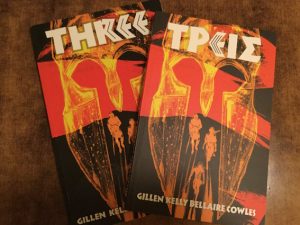
July 9, 2020, by Lynn Fotheringham
Welcome
(Ελληνικά πιο κάτω.) (Revised 29/07/20.)
Welcome to my new blog! I am a lecturer in the Department of Classics and Archaeology here at the University of Nottingham. As a child I fell in love with Greek mythology, as a teenager with the Latin language, and I have been lucky enough to build my career on these enthusiasms. I teach and research a wide range of topics, from Latin grammar to representations of ancient Greece and Rome in pop culture. This blog will focus on the pop culture side of things, specifically on historical fiction in a range of media: novels, comics, film and television.

When I was wee*, I used to read from this book to my Mum when she was cooking!
I’m going to start with a series of comparisons between the historical comic Three and the ancient sources. But in the future I expect to cover a range of different topics, from my attempts to catalogue all the examples of a particular phenomenon – e.g., comics set in ancient Greece, prose novels about the Persian War – to my thoughts on whatever I happen to be reading/watching at the moment. I see the blog as a place to share bite-sized aspects of my work which otherwise might take years to publish – or might never be published at all. It will be eclectic because historical fiction is a multi-faceted thing.
Some definitions:
-
pop culture: I’m not going to make any attempt to measure ‘popularity’. I use ‘pop culture’ to encompass everything that is produced outside academia or for consumption outside academia.
-
historical: I won’t deal only with fiction about historically verifiable/plausible events, but will also include fictionalisations of Greco-Roman mythology. Perhaps even works of fantasy…
-
antiquity/ancient history: These labels refer primarily to Greek and Roman culture from roughly 800 (or 1200) B.C.E. to 450 C.E. This is a lazy shorthand which I have exploited in order to keep the title of this blog shorter; I apologise to scholars, students and enthusiasts of the early history of parts of the world other than Greece and Rome. I will occasionally be able to refer to other cultures; for example, I am currently re-reading Gore Vidal’s Creation, which has a very wide reach.
-
fiction: This is actually the most difficult term of the four to define. Perhaps I think that because I’m currently fretting over how to define Roderick Milton’s Tell Them in Sparta or Tom Holland’s Persian Fire. It also seems to me that we don’t tend to apply the word ‘fiction’ to historical films such as Quo Vadis and television series like Warrior Queen, that deal with ‘real’ historical characters (Nero, Boudicca), even though much of their content is, inevitably, fictional. Perhaps it’s too obvious to need saying. And finally, I believe that even academic history is a creative act involving the imagination. But even if the lines weren’t as fuzzy as they are, I might still discuss the odd work that wouldn’t normally be classified as ‘fiction’ as context for/contrast to contemporary fiction dealing with the same subject-matter. There. That’s all my excuses lined up for including all kinds of things.
Please feel free to comment, to disagree, and to make reading recommendations. In case you’d prefer to e-mail me: lynn[dot]fotheringham[at]nottingham[dot]ac[dot]uk.
* ‘wee’ = ‘small’ in Scots dialect.
Photo of Lynn by Matt Brooker; photos of books by Lynn Fotheringham.
Book in photograph of Lynn: The Myths of Greece and Rome by H.A. Guerber, first published 1907.
Καλώς ήρθατε

Graphic novel ‘Three’ in English and Greek
(Διορθώθηκε 10/08/20.)
Καλώς ήρθατε στο καινούργιο μου blog! Λέγομαι Lynn και είμαι λέκτορας στο Τμήμα Κλασσικών Σπουδών και Αρχαιολογίας εδώ στο Πανεπιστήμιο του Νότιγχαμ. Από μικρή ηλικία αγάπησα την Ελληνική μυθολογία κι από την εφηβεία μου τη λατινική γλώσσα. Έτσι, είμαι τυχερή που μπόρεσα να χτίσω την καριέρα μου γύρω από τα αντικείμενα που αγαπώ περισσότερο. Διδάσκω και ερευνώ πολλά διαφορετικά θέματα, συμπεριλαμβανομένων της λατινικής γραμματείας και του τρόπου που η ποπ κουλτούρα δηλ. οι σύγχρονοι δημιουργοί και η κοινή γνώμη προσεγγίζουν, θεωρούν και αναπαριστούν τον αρχαίο κόσμο. Σ’ αυτό το blog θα επικεντρωθώ σε αυτό που στα αγγλικά λέμε popular culture (ποπ κουλτούρα), και κυρίως στη σύγχρονη μυθοπλασία που βασίζεται στην αρχαία Ελλάδα και Ρώμη, σε διαφορετικά μέσα (μυθιστορήματα, κόμικς, σινεμά, τηλεόραση).
Θα ξεκινήσω με μια σειρά συγκρίσεων του κόμικ Τρεις με τις αρχαίες πηγές. Μιας και το έργο έχει μεταφραστεί στα ελληνικά, θα προσπαθήσω να μεταφράσω και τις δημοσιεύσεις μου προς όφελος των Ελλήνων αναγνωστών του βιβλίου. Στο μέλλον θα επεκταθώ σε άλλα θέματα που ενδεχομένως να μην αναρτήσω στα ελληνικά. Εάν διαβάζετε τις δημοσιεύσεις στα αγγλικά, αλλά προτιμάτε να γράφετε στα ελληνικά (άλλο πράμα το διάβασμα και άλλο το γράψιμο!), κανένα πρόβλημα, παρακαλώ σχολιάστε στα ελληνικά.
Μπορείτε να μου στείλετε e-mail αν προτιμάτε· lynn[dot]fotheringham[at]nottingham[dot]ac[dot]uk.
(Στη φωτογραφία επάνω, είμαι εγώ με ένα βιβλίο το οποίο διάβαζα μικρή στη μητέρα μου όταν μαγείρευε τα απογεύματα: The Myths of Greece and Rome δηλ. Οι Μύθοι της Ελλάδας και της Ρώμης της H.A. Guerber.)
Φωτογραφία της Lynn από τον Matt Brooker· φωτογραφίες βιβλίων από την Lynn Fotheringham.
Επιμέλεια κειμένου: Τζίνα Ρέκκα
No comments yet, fill out a comment to be the first

Leave a Reply